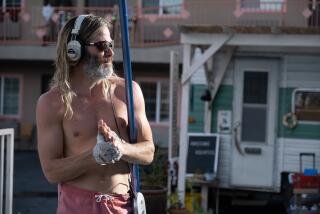Give Anna a ‘Smiley Face’
- Share via
Gregg Araki’s delirious “Smiley Face” is an unabashed valentine to Anna Faris, an opportunity for the actress to show that she can carry a movie composed of often hilarious nonstop misadventures. No matter how outrageously or foolishly Faris’ Jane behaves, she remains blissfully appealing -- such are Faris’ fearless comedic skills and the freshness of her radiant blond beauty.
Jane finds herself on a seaside Ferris wheel and, imagining she’s hearing the stentorian, inquisitorial God-like voice of the late actor Roscoe Lee Browne, begins to wonder how she got there. She’s an aspiring but not exactly driven young actress, who at precisely 9:16 a.m. starts taking hits on her bong, topping out with a plate of cupcakes that just happen to be laced with marijuana. Jane is hopelessly stoned, alternating between giddiness and paranoia, prone to extravagant hallucinations yet not quite forgetting her looming appointments -- a late-morning audition and an afternoon deadline to pay off a debt to her drug dealer (Adam Brody).
In drawing from Dylan Haggerty’s zany, imaginative script, Araki deftly places Jane, lurching between mounting confusion and startling moments of clarity, in a very real world where her erratic behavior is met with either vast indifference or downright hostility and fear. John Cho’s Mikey, a young truck driver for an El Monte sausage factory, is one of the handful of people Jane encounters in the course of her increasingly crazy day who is concerned for her fate even though she befuddles him. Also key are Marion Ross as an elegant lady who mistakenly entrusts Jane with a most improbable and exceedingly valuable first edition and John Krasinski as a handsome but nerdy guy who once fell hard for Jane.
The Los Angeles of “Smiley Face” is the same city depicted in most of Araki’s films, a place where young people are trying to sort out their lives in an environment at once enticing and overwhelmingly, even crushingly, impersonal. Araki’s view of his characters is often amused but always compassionate, though he also can express deep anger deftly. He railed against the ravages of AIDS in his savagely comic, deeply romantic “The Living End” (1992), and in 2005 made his most ambitious film, “Mysterious Skin,” a poetic yet unflinching exploration of the long-term consequences of child molestation. In the wake of that most effective film, it’s no wonder that the director would want to make “Smiley Face” his lightest movie ever -- one that honors the heady spirit of Cheech and Chong.
“Smiley Face.” MPAA rating: R for drug content, language and some sexual material. Running time: 1 hour, 25 minutes. Exclusively at the Nuart through Thursday, 11272 Santa Monica Blvd., West Los Angeles, (310) 281-8223.
More to Read
Only good movies
Get the Indie Focus newsletter, Mark Olsen's weekly guide to the world of cinema.
You may occasionally receive promotional content from the Los Angeles Times.










